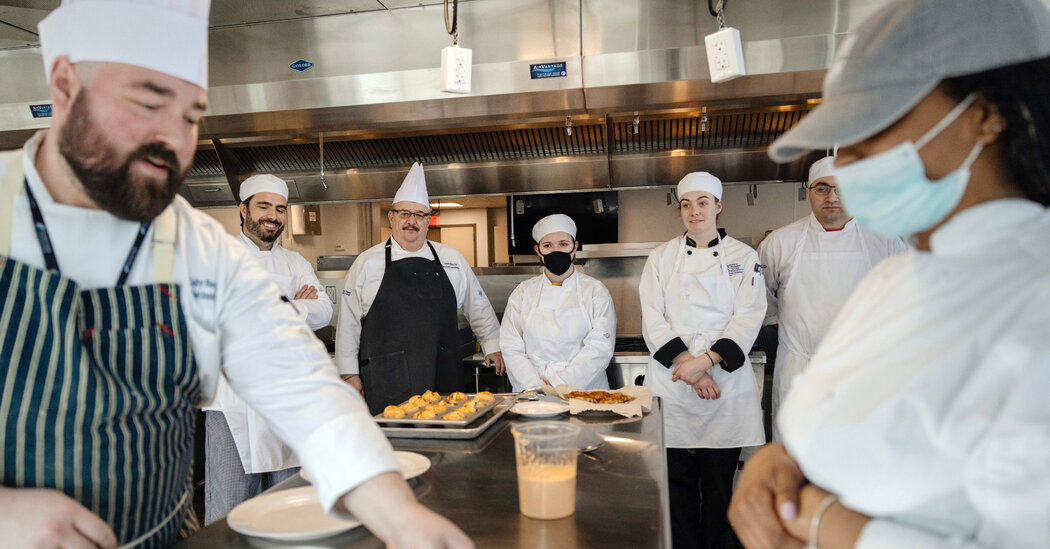
HAVERHILL, Mass. — The students all wore white chef coats, houndstooth pants and short toques as they tasted their lamb tagines for salt. Floor-to-ceiling windows in the sleek kitchen framed a sweeping view of the Merrimack River.
Here, north of Boston in the culinary school at Northern Essex Community College, the students will learn about sous-vide cooking, use pastry sheeters to laminate dough, break down whole pigs and try molecular gastronomy techniques. The job placement rate after graduation is 100 percent.
“Probably even more,” said Denis Boucher, the coordinator of the culinary program. “There could be two or three jobs per student around here.”
The price of that education: about $6,500 for a certificate and $14,000 for an associate degree — or less, as many culinary students receive grants or scholarships. Compare that with the Culinary Institute of America, the acclaimed private school where a single semester at its Hyde Park, N.Y., campus costs nearly $20,000.
Less than a decade ago, the number of culinary schools in the United States was rising rapidly. But the last few years have been challenging.
Confronted with increasingly steep operating costs and a pandemic that hamstrung the restaurant business, several schools have permanently closed campuses, including the New England Culinary Institute and the International Culinary Center (which licensed its curriculum to the Institute of Culinary Education). Johnson & Wales University, which has a well-known culinary program, closed two campuses in 2020. Even before the arrival of Covid-19, Le Cordon Bleu closed all of its North American outposts.
What’s left, for the most part, are the most recognizable names — like the Culinary Institute of America and the Institute of Culinary Education, which each reported steady enrollment throughout the pandemic — and culinary schools at community colleges like Northern Essex, which has doubled its enrollment to 33 students since the program began in 2020, and expects to more than double that total this fall.
Many other community colleges have opened or expanded culinary programs in recent years, offering a high-quality education at a fraction of the cost of a private cooking school.
While they lack the prestige of the big names, these institutes may be better matched to the current economy. They can be a critical resource for a restaurant business in desperate need of line cooks and other skilled workers, as well as for students seeking to start a career without running up big debts.
“If you want a really fancy culinary school, then sure,” said Katherine Ventura, 18, a culinary student at Northern Essex. “But if you want something quick, I would recommend this.”
Prospective students have long wondered whether private colleges are worth the price. That question can be especially fraught with culinary school, where tuitions are usually high but starting wages for restaurant workers tend to be low.
“You come out as a line cook,” said Mr. Boucher, who attended the Culinary Institute of America. “How can you afford that kind of debt?”
Mark Erickson, the provost of the Culinary Institute of America, said the school costs so much because it offers a full college education, beyond just culinary training. Graduates learn the skills to become not only line cooks, he added, but also restaurant owners and executive chefs.
The boom in community-college cooking programs has caught the attention of local governments and businesses, which are playing an active role in driving their growth.
The state-of-the-art kitchens at Northern Essex Community College were built and equipped with funding from the state and support from Lupoli Companies, a Massachusetts real estate developer that owns the culinary school building and helped cover some infrastructure costs. Students can work in one of Lupoli’s restaurants, Bosa, as part of the curriculum to get real-world experience, and the school doesn’t have to pay any operational costs. And on a recent afternoon, students got a lesson in breaking down various meats at Haverhill Beef Company, a butcher shop.
“Community colleges are finding creative ways to be able to offer what these larger colleges had to spend so much money to offer,” Mr. Boucher said.
Butler Community College’s culinary school in El Dorado, Kan., which will expand into a new building this fall, has a partnership with the college’s agriculture department, so students can use its gardens for growing and harvesting food. At Mott Community College in Flint, Mich., where a culinary institute opened in 2019, profits from the student-run coffee shop fund scholarships.
American community colleges, which began appearing in the late 19th century, didn’t always offer culinary courses; cooking was traditionally considered the domain of trade schools.
But by the 1980s, as public-broadcast cooking shows attracted large audiences and more restaurants opened across the country, community colleges were integrating culinary training, said Mary Petersen, the president of the Center for the Advancement of Foodservice Education, in Annapolis, Md.
For all their innovation, community colleges still can’t provide everything that private schools do, like a vast network of influential alumni or internships around the world.
Jeffrey Gardner, a consulting chef in Atlanta, said the community college graduates he has hired often have an outdated, classically French training, as their teachers may not have worked in restaurants recently.
“A lot of what they were taught would have been fine for ’90s hotel banquets,” he said.
Ms. Ventura, the student at Northern Essex, was surprised that the instruction didn’t entirely reflect the ethnic diversity of her peers. “The type of culture we are cooking for, usually it is just Western or something,” she said. “I wish it was more Asian or North African or something more different.”
Such drawbacks may not matter as much for the many students who simply want to find a reliable job rather than become a celebrity chef or open a specific style of restaurant.
That practicality is exactly what these programs are designed for, said Altarius Moody, the director of hospitality management and culinary arts at Durham Technical Community College, in North Carolina. Often those who enroll have full-time jobs or families to take care of; programs like Durham Tech’s, he said, provide sizable scholarships, offer courses at night and enable people to graduate within a year.
Michael Stamets, the associate dean of the hospitality programs at the State University of New York College at Broome, said that even though the program isn’t widely renowned, it is well respected in the Binghamton area, where most students are seeking employment.
If the Culinary Institute of America prepares students “a little better for a global market,” he said, “we are preparing them for a local market.”
Many of those local markets are becoming dining hubs in their own right and are in need of employees.
Prince George’s Community College, in Largo, Md., is about 15 miles from National Harbor, a large dining and residential complex along the Potomac River that opened in 2008. The area’s growth spurred significant investment by the school and county into the school’s culinary program in 2018, said Denise Ware-Jackson, the chairwoman of the college’s wellness, culinary and hospitality department.
Sussex County Community College, in Newton, N.J., recently refocused its food and beverage management program on professional cooking because of the sheer number of requests from local businesses for cooks, said Martin Kester, the program supervisor for culinary arts and hospitality. All 12 of Sussex’s culinary graduates from the last three years are still working in the food business, he said.
The warm welcome that community college graduates are getting in the restaurant industry is not just a function of the labor shortage. Several chefs who have hired them say they are among their most dedicated and effective employees.
“They are learning how to work in the real kitchens that most restaurants in the U.S. are, rather than being trained to just work at the top echelon of restaurants,” said Mina Park, an owner of the Korean restaurant Shiku, in Los Angeles, who has hired from community college culinary schools. “There is this curiosity and openness and go-getter attitude,” and less ego than she’s seen in those who went to private schools.
Culinary programs can also attract students who may not have otherwise considered college. Many community colleges are struggling with declining enrollment, as students abandoned schooling at the pandemic’s onset and never returned.
Stephanie Kirkpatrick, 30, had always wanted to attend culinary school, but found most programs too expensive. She recently enrolled in Butler’s culinary program, and will graduate with her associate degree in two years.
“All the teachers are really there for you,” she said. “The bigger schools, they have a lot going on,” she added. “It is harder for them to be closer to students.”
Community college degrees have long been disparaged as inferior to those from four-year institutions. Culinary institutes, which tend to attract more attention from prospective students than other trade programs, may help reverse that, said Mr. Kester, of Sussex County Community College.
“There is still a stigma that it is a community college,” he said. “That is something we are working very hard to change with programs like this one that are very forward facing and immersed in the community.”
Many private schools justify their higher expense by telling students that they’ll be able to lead a restaurant right after graduating, said Mr. Boucher, who teaches at Northern Essex.
“Community colleges don’t set that level of expectation,” he added. “Students have an expectation that they are going to be worthy cooks when they get into the kitchen, and that they will work their way up the ladder.”
The goal of these programs is to sell cooking not as a path to clout or power, he said. They sell it for what it is: hard work.




